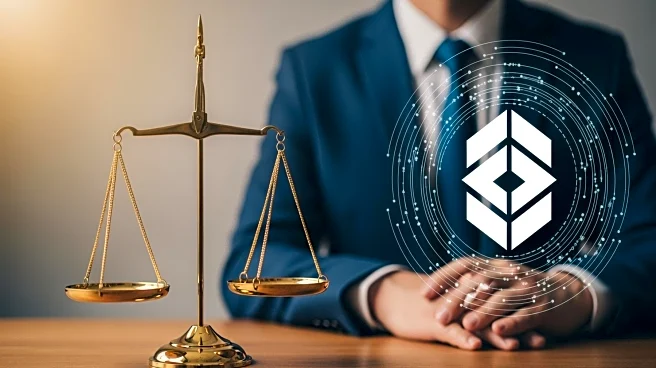What's Happening?
President Trump has issued a pardon for Changpeng Zhao, the founder of Binance, a major cryptocurrency exchange. Zhao was previously convicted for violating the Bank Secrecy Act and failing to maintain
anti-money-laundering controls at Binance, which led to a $4.3 billion settlement with the U.S. government. This pardon comes after Zhao served a four-month prison sentence and stepped down as CEO of Binance. The pardon is seen as a move to counter the Biden Administration's perceived 'war on cryptocurrency,' according to White House press secretary Karoline Leavitt. Zhao's criminal record had hindered Binance's ability to operate in the U.S., but the pardon may facilitate the company's return to the American market.
Why It's Important?
The pardon of Changpeng Zhao is significant as it may influence the regulatory landscape for cryptocurrency in the U.S. Binance, being one of the largest crypto exchanges globally, has faced challenges in the U.S. due to Zhao's conviction. The pardon could accelerate Binance's efforts to regain access to U.S. markets, impacting the broader cryptocurrency industry. Additionally, the decision has sparked debate over potential conflicts of interest, given the Trump family's involvement in the crypto sector through ventures like World Liberty Financial. The move may also affect the perception of regulatory enforcement in the crypto industry, especially following the collapse of FTX and the conviction of its founder, Sam Bankman-Fried.
What's Next?
Following the pardon, Binance may seek to re-establish its presence in the U.S. market, potentially leading to increased competition and innovation in the cryptocurrency sector. The decision may also prompt reactions from political leaders and regulatory bodies, particularly those concerned about the implications of pardoning executives involved in white-collar crimes. The Treasury Department's ongoing monitorship of Binance could be affected, depending on further actions by the Treasury Secretary. Additionally, the pardon may influence future regulatory approaches to cryptocurrency, as industry advocates argue Zhao's conviction was an overreach by regulators.
Beyond the Headlines
The pardon raises ethical and legal questions regarding the influence of political connections in legal outcomes, especially in the context of the Trump family's crypto ventures. It highlights the complex relationship between government policy and emerging financial technologies, as well as the potential for political decisions to impact market dynamics. The case underscores the ongoing debate over the balance between innovation and regulation in the cryptocurrency industry, and the role of executive power in shaping legal and economic landscapes.










